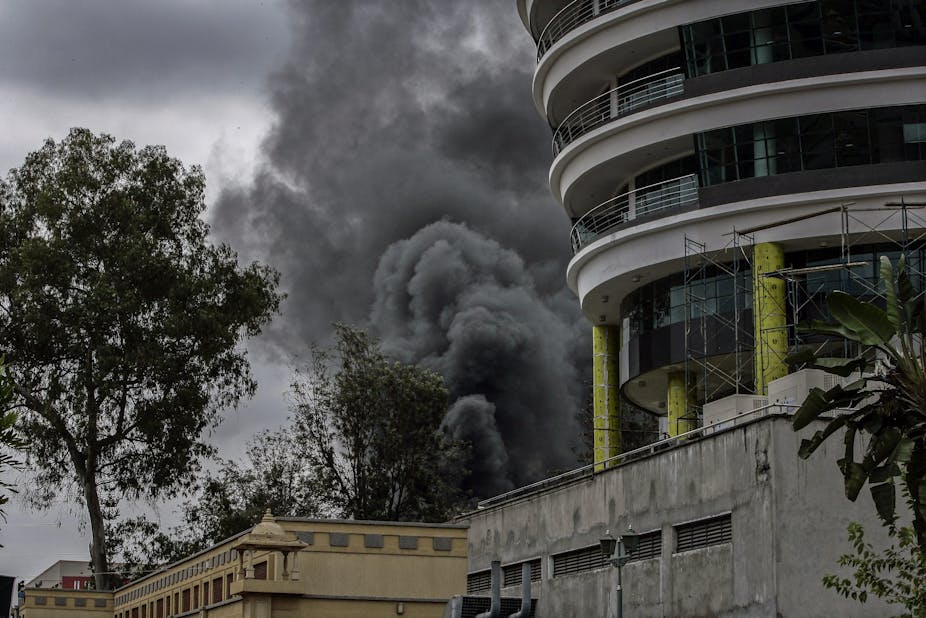The Somali-based Islamic militant group Al-Shabaab’s weekend attack on the upscale Westgate shopping mall in Nairobi - which has left at least 60 people dead - poses a significant security threat not just to Kenya and its neighbours, but to the whole world.
Only a few weeks ago, Al-Shabaab, which emerged out of the Union of Islamic Courts in 2007, was considered a [spent force](http://online.wsj.com/article/SB10001424052702304213904579091000625812612.html. It had been severely weakened by military operations involving 4,000 Kenyan troops of the African Union Mission in Somalia (AMISOM).
In the past few years, the group has been defeated and driven out of several strategic locations, including the Somali capital of Mogadishu and the seaport of Kismayo. This has enabled the legitimate - albeit weak - Somali government, which was established in September 2012, to take control of some parts of the country.
Al Shabaab also damaged itself earlier this year after a power struggle in which its former commander, the US-born Omar Hammami (alias Abu Mansoor al-Amriki) was toppled. Hammami, who was on the US most wanted list, together with his colleague from the UK Usama al-Britani, were ambushed and shot dead earlier this month by allies of the new leader, Ahmed Abdi Godane. It is Godane who was instrumental in establishing Al-Shabaab’s affiliation with al-Qaeda in 2012. A little earlier, Godane had planned the July 2010 bombing in the Ugandan capital of Kampala to retaliate against Uganda’s participation in AMISOM.
To consolidate his power base earlier this year, Godane - who is also known as Mukhtar Abu Zubayr - executed four top commanders of Al Shabaab, including the group’s co-founder known as Sheikh Ibrahim al-Afghani, a veteran of the war in Afghanistan. His brutal assumption of power compelled the group’s spiritual leader, Sheikh Hassan Dahir Aweys, to flee for his life. The Somali government subsequently captured Aweys.
The assault on the Nairobi shopping mall was Godane’s way of announcing to the world that under his leadership, Al Shabaab was bold enough to take the fight to its foes on their own ground. It demonstrates the further radicalization of the group by the global jihadists.

The attack on the mall - which has earned the group enormous worldwide publicity - illustrates three lessons for Kenya and for the rest of the world. The first is that even when a terrorist group is split and has been severely weakened or brought down to its knees, it has the potential to cause considerable damage. The publicity which the mall attack has generated will help the group recruit more fighters from around the world, vindicating Godane’s gamble and encouraging the group to become even more adventurous.
The second is that the international community’s weak attempts to resuscitate institutions and establish order in Somalia is likely to cost that country, its neighbours and the rest of the world dearly. Somalia’s public institutions have decayed steadily due to the civil war that followed the overthrow of former dictator Mohammed Siad Barre in 1991. While the US, the EU, China, Russia, Australia and India have been willing to deploy their naval forces in the western part of the Indian Ocean to combat piracy in recent years, they have not had the political will to address the root causes of piracy and terrorism inside Somalia.
The final lesson is that terrorism and insecurity in much of Africa are intimately tied up with poor governance. Somalia has been a “failed state” for more than 20 years. While Kenya has a much better governance system, its president Uhuru Kenyatta and his deputy William Ruto are currently facing charges at the International Criminal Court (ICC) in The Hague. As the two leaders’ attention has been absorbed by issues relating to the ICC, the fact that the country is fighting a war in Somalia does not appear to have received the attention it deserves.
Indeed, when Kenyatta gave a media conference on the night of September 22 regarding the attack on the shopping mall, he was surrounded by several political leaders, including his rivals in the March 2013 presidential election: Raila Odinga and Musalia Mudavadi, but Ruto was missing. Instead, Ruto was in The Hague attending court. There might come a time when the Kenyan people - the majority of whom support the ICC - will demand that their leaders choose between the imperative to govern effectively and the desire to cooperate with the ICC.
The international community, including Australia, should respond to this terrorist attack by focusing on improving governance in Somalia and the Horn of Africa region. This would be a cheaper and more effective way of combating both transnational terrorism and piracy off the Somali coast.

